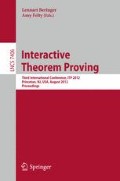Abstract
Hybrid systems, i.e., dynamical systems combining discrete and continuous dynamics, have a complete axiomatization in differential dynamic logic relative to differential equations. Differential invariants are a natural induction principle for proving properties of the remaining differential equations. We study the equational case of differential invariants using a differential operator view. We relate differential invariants to Lie’s seminal work and explain important structural properties resulting from this view. Finally, we study the connection of differential invariants with partial differential equations in the context of the inverse characteristic method for computing differential invariants.
This material is based upon work supported by the National Science Foundation under NSF CAREER Award CNS-1054246, NSF EXPEDITION CNS-0926181, and under Grant No. CNS-0931985.
Access this chapter
Tax calculation will be finalised at checkout
Purchases are for personal use only
Preview
Unable to display preview. Download preview PDF.
References
Alur, R., Courcoubetis, C., Halbwachs, N., Henzinger, T.A., Ho, P.H., Nicollin, X., Olivero, A., Sifakis, J., Yovine, S.: The algorithmic analysis of hybrid systems. Theor. Comput. Sci. 138(1), 3–34 (1995)
Collins, G.E., Hong, H.: Partial cylindrical algebraic decomposition for quantifier elimination. J. Symb. Comput. 12(3), 299–328 (1991)
Cox, D.A., Little, J., O’Shea, D.: Ideals, Varieties and Algorithms: An Introduction to Computational Algebraic Geometry and Commutative Algebra. Springer (1992)
Davenport, J.H., Heintz, J.: Real quantifier elimination is doubly exponential. J. Symb. Comput. 5(1/2), 29–35 (1988)
Evans, L.C.: Partial Differential Equations. Graduate Studies in Mathematics, 2nd edn., vol. 19. AMS (2010)
Gentzen, G.: Untersuchungen über das logische Schließen. II. Math. Zeit. 39(3), 405–431 (1935)
Grigor’ev, D.Y.: Complexity of Quantifier Elimination in the Theory of Ordinary Differential Equations. In: Davenport, J.H. (ed.) ISSAC 1987 and EUROCAL 1987. LNCS, vol. 378, pp. 11–25. Springer, Heidelberg (1989)
Gulwani, S., Tiwari, A.: Constraint-based approach for analysis of hybrid systems. In: Gupta, Malik [9], pp. 190–203
Gupta, A., Malik, S. (eds.): CAV 2008. LNCS, vol. 5123. Springer, Heidelberg (2008)
Hartshorne, R.: Algebraic Geometry. Graduate Texts in Mathematics, vol. 52. Springer (1977)
Henzinger, T.A.: The theory of hybrid automata. In: LICS, pp. 278–292. IEEE Computer Society, Los Alamitos (1996)
Hilbert, D.: Über die Theorie der algebraischen Formen. Math. Ann. 36(4), 473–534 (1890)
Proceedings of the 27th Annual ACM/IEEE Symposium on Logic in Computer Science, LICS 2012, Dubrovnik, Croatia. IEEE Computer Society (2012)
Lie, S.: Über Differentialinvarianten, vol. 6. Teubner (1884); English Translation: Mr. Ackerman (1975); Sophus Lie’s 1884 Differential Invariant Paper. Math. Sci. Press, Brookline, Mass.: (1884)
Lie, S.: Vorlesungen über continuierliche Gruppen mit geometrischen und anderen Anwendungen. Teubner, Leipzig (1893)
Lie, S.: Über Integralinvarianten und ihre Verwertung für die Theorie der Differentialgleichungen. Leipz. Berichte 49, 369–410 (1897)
Olver, P.J.: Applications of Lie Groups to Differential Equations, 2nd edn. Springer (1993)
Platzer, A.: Differential dynamic logic for hybrid systems. J. Autom. Reas. 41(2), 143–189 (2008)
Platzer, A.: Differential-algebraic dynamic logic for differential-algebraic programs. J. Log. Comput. 20(1), 309–352 (2010)
Platzer, A.: Logical Analysis of Hybrid Systems: Proving Theorems for Complex Dynamics. Springer, Heidelberg (2010)
Platzer, A.: The complete proof theory of hybrid systems. In: LICS [13]
Platzer, A.: Logics of dynamical systems (invited tutorial). In: LICS [13]
Platzer, A.: The structure of differential invariants and differential cut elimination. In: Logical Methods in Computer Science (to appear, 2012)
Platzer, A., Clarke, E.M.: Computing differential invariants of hybrid systems as fixedpoints. In: Gupta, Malik [9], pp. 176–189
Platzer, A., Clarke, E.M.: Computing differential invariants of hybrid systems as fixedpoints. CAV 2008 35(1), 98–120 (2009); Special issue for selected papers from CAV 2008
Platzer, A., Clarke, E.M.: Formal Verification of Curved Flight Collision Avoidance Maneuvers: A Case Study. In: Cavalcanti, A., Dams, D.R. (eds.) FM 2009. LNCS, vol. 5850, pp. 547–562. Springer, Heidelberg (2009)
Platzer, A., Quesel, J.-D., Rümmer, P.: Real World Verification. In: Schmidt, R.A. (ed.) CADE-22. LNCS, vol. 5663, pp. 485–501. Springer, Heidelberg (2009)
Prajna, S., Jadbabaie, A.: Safety Verification of Hybrid Systems Using Barrier Certificates. In: Alur, R., Pappas, G.J. (eds.) HSCC 2004. LNCS, vol. 2993, pp. 477–492. Springer, Heidelberg (2004)
Prajna, S., Jadbabaie, A., Pappas, G.J.: A framework for worst-case and stochastic safety verification using barrier certificates. IEEE T. Automat. Contr. 52(8), 1415–1429 (2007)
Sankaranarayanan, S., Sipma, H.B., Manna, Z.: Constructing invariants for hybrid systems. Form. Methods Syst. Des. 32(1), 25–55 (2008)
Tarski, A.: A Decision Method for Elementary Algebra and Geometry, 2nd edn. University of California Press, Berkeley (1951)
Zeidler, E. (ed.): Teubner-Taschenbuch der Mathematik. Teubner (2003)
Author information
Authors and Affiliations
Editor information
Editors and Affiliations
Rights and permissions
Copyright information
© 2012 Springer-Verlag Berlin Heidelberg
About this paper
Cite this paper
Platzer, A. (2012). A Differential Operator Approach to Equational Differential Invariants. In: Beringer, L., Felty, A. (eds) Interactive Theorem Proving. ITP 2012. Lecture Notes in Computer Science, vol 7406. Springer, Berlin, Heidelberg. https://doi.org/10.1007/978-3-642-32347-8_3
Download citation
DOI: https://doi.org/10.1007/978-3-642-32347-8_3
Publisher Name: Springer, Berlin, Heidelberg
Print ISBN: 978-3-642-32346-1
Online ISBN: 978-3-642-32347-8
eBook Packages: Computer ScienceComputer Science (R0)

